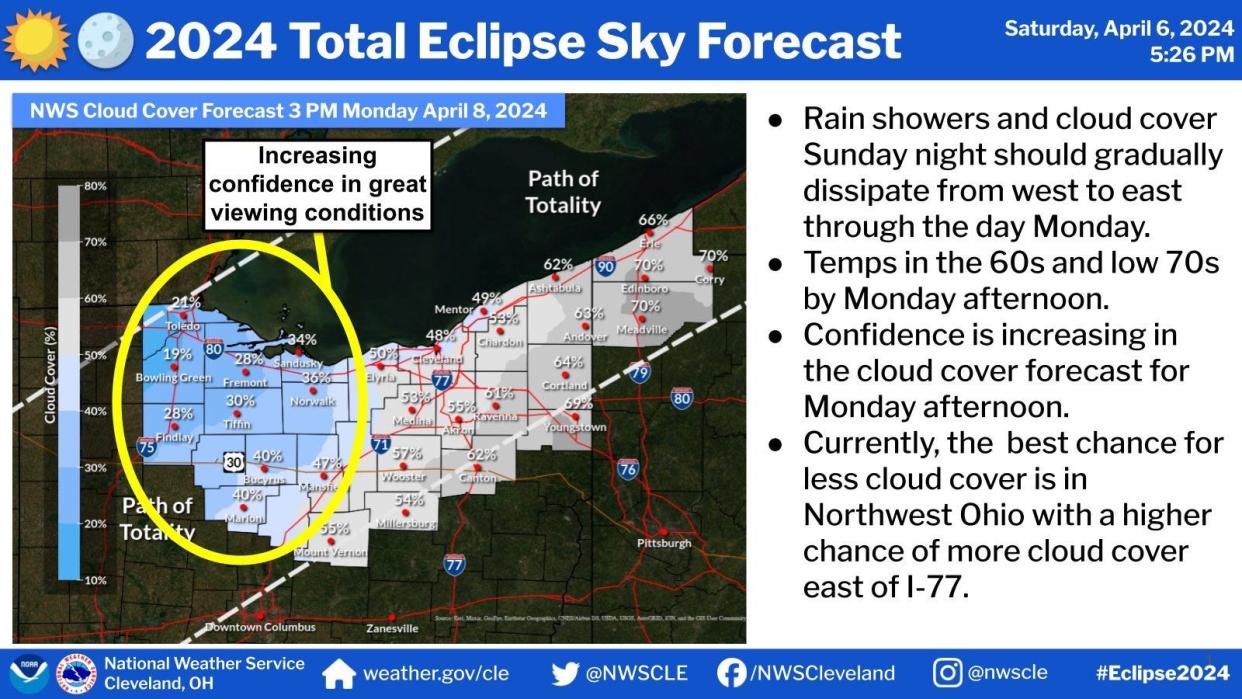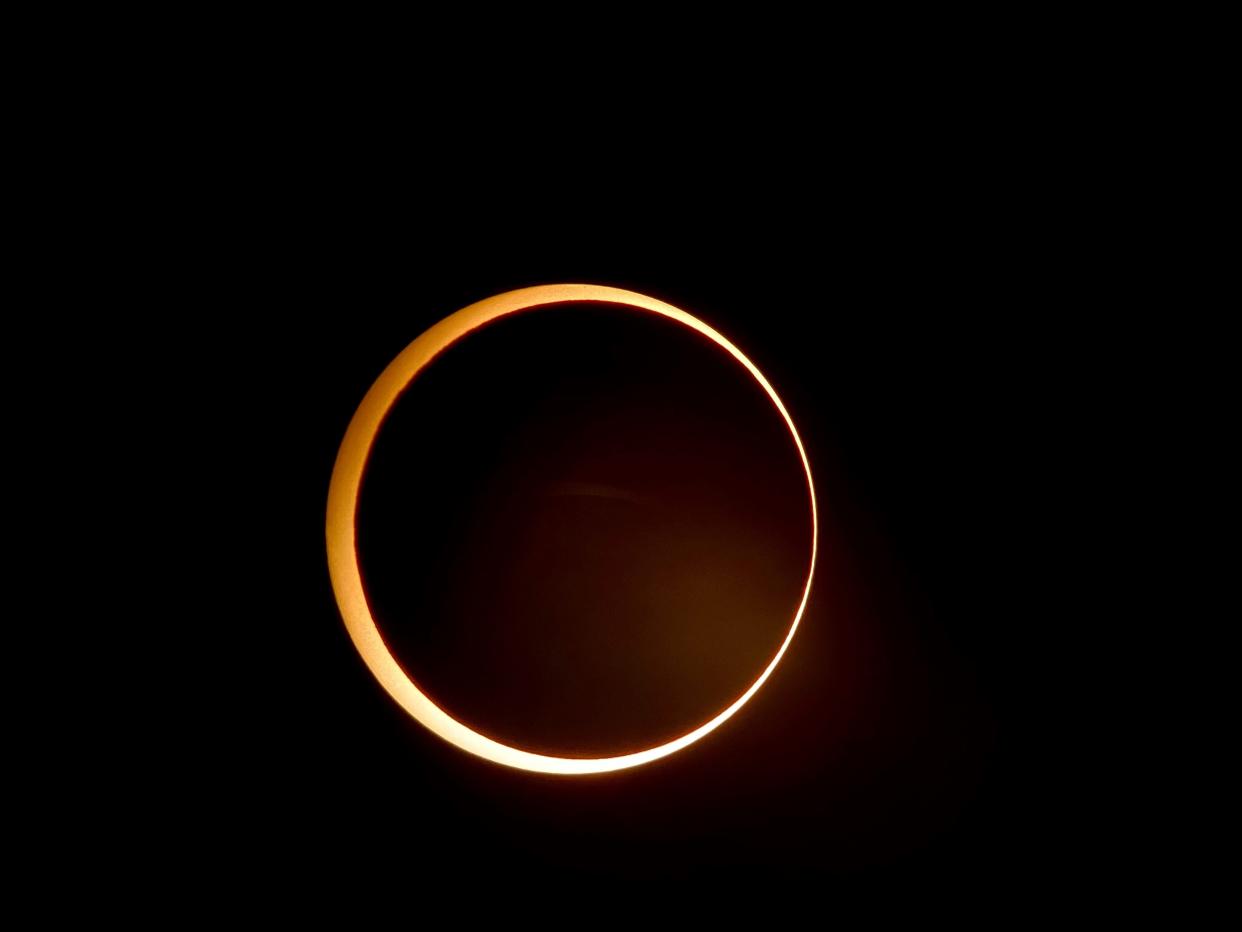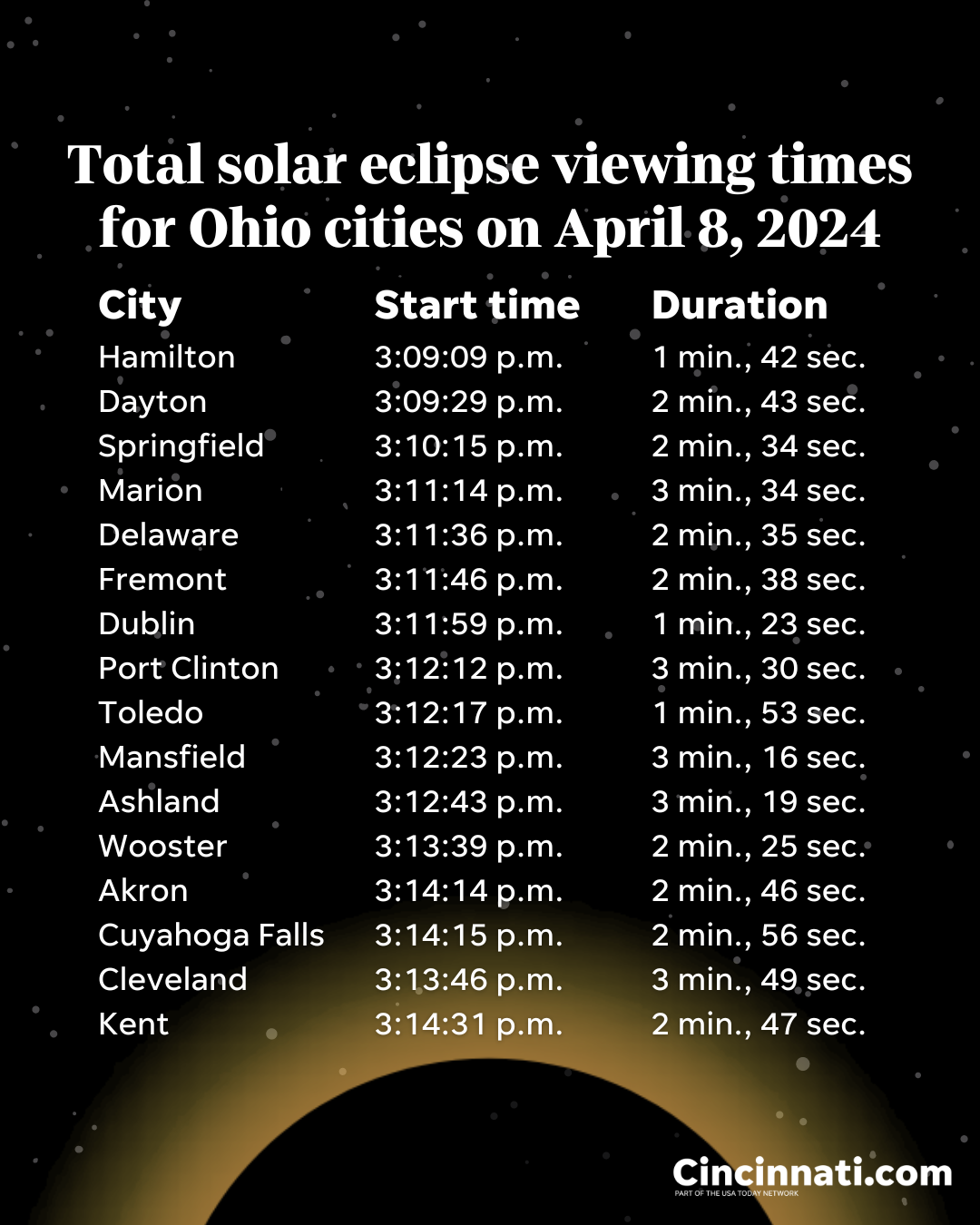The solar eclipse is today. What's the forecast in Columbus? Check weather updates here
Thick clouds roam the skies this morning in the weather forecast for Columbus as we await the solar eclipse today.
Columbus isn't in the path of totality, but it will still see a partial eclipse that will last 2 hours and 38 minutes. At the peak of the eclipse, the moon will obscure approximately 99.4% of the sun.
Here are the latest updates on Columbus' eclipse viewing conditions, according to the National Weather Service office in Wilmington. Remember, whatever the forecast is for today, it's important to wear proper safety glasses when viewing the eclipse.

What will the weather be like in Columbus on eclipse day, April 8?
The NWS seven-day detailed forecast states mostly sunny skies on Monday afternoon during the eclipse. Temperatures will be warm, with a high near 73, and cloudy morning skies may gradually become mostly sunny. Monday currently appears to be the only day this week with "dry and warm conditions," according to the forecast.
Light rain moved into the region Sunday night, so will folks be able to see the eclipse Monday afternoon?
There is still some uncertainty regarding the eclipse viewing experience. The NWS reports that "the cloud forecast remains challenging" and will depend on the placement and timing of this weather system. Two potential scenarios are currently in the forecast.
There's a scenario where partial clearing could occur Monday afternoon if the system is blocked by ridging over the Great Lakes, causing it to move slightly to the north. However, the system could barrel over the Great Lakes and extend south, causing poor viewing conditions.
"Most likely, it will be breaking up by eclipse time within the path of totality, but it could be close where clouds might hang in until early afternoon," the forecast reads. "There will be a better chance of having fewer low (opaque) clouds during this event the further west you are. There will be some cirrus spreading in during the afternoon. Most likely this will be thin, but there is some possibility of thicker areas."
The situation is currently playing out as expected. We'll be tracking high clouds throughout the next few hours. pic.twitter.com/QHv0FgK5Nb
— NWS Wilmington OH (@NWSILN) April 8, 2024
What happens if it's cloudy on the day of the eclipse?
The total eclipse will happen, rain or shine. But cloud coverage will make it a bit darker, and experts say the transition into total darkness will seem more sudden.
Due to this, observers may miss the subtle changes as the sun slowly disappears and day becomes night.

What time will Columbus see the solar eclipse?
For Columbus, the eclipse will begin around 1:55 p.m. as the moon slides in front of the sun. The eclipse is expected to peak at 3:12 p.m. in the capital city, with the moon moving past the sun by 4:26 p.m.
The total eclipse will begin in Ohio at 3:08 p.m. with the final exit of the moon’s shadow at 3:19 p.m.
The eclipse will start in Texas and then make its way across the country. The path to totality will also pass over states that include Oklahoma, Arkansas, Missouri, Illinois, Kentucky, and Indiana before arriving in Ohio. Pennsylvania, New York, Vermont, New Hampshire and Maine also lie in the eclipse path.
Read: 2024 solar eclipse: 'New' path of totality map reveals Ohio will see less of the solar eclipse
What time is the eclipse in Ohio?
According to National Eclipse, Ohio residents can first see the moon overtake the sun at 1:53 p.m. before it fully reappears at 4:30 p.m.
The eclipse totality will last from 3:08 to 3:19 p.m. as it cuts a swath from southwest to northeast Ohio.
Here's when some Ohio cities along its path can expect the total eclipse to being, and how long it will last:
Hamilton -- Begins at 3:09:09 p.m., will last 1 minute, 42 seconds.
Dayton -- 3:09:29 p.m., will last 2 minutes, 43 seconds.
Springfield -- 3:10:15 p.m., will last 2 minutes, 34 seconds.
Marion -- 3:11:14 p.m., duration 3 minutes, 34 seconds.
Delaware -- 3:11:36 p.m., will last 2 minutes, 35 seconds.
Fremont -- 3:11:46 p.m., duration 2 minutes, 38 seconds.
Dublin -- 3:11:59 p.m., will last 1 minute, 23 seconds.
Port Clinton -- 3:12:12 p.m., duration 3 minutes, 30 seconds.
Toledo -- 3:12:17 p.m., duration 1 minute, 53 seconds.
Mansfield -- 3:12:23 p.m., will last 3 minutes, 16 seconds.
Ashland -- 3:12:43 p.m., duration 3 minutes, 19 seconds.
Wooster -- 3:13:39 p.m., duration 2 minutes, 25 seconds.
Akron -- 3:14:14 p.m., will last 2 minutes, 46 seconds.
Cuyahoga Falls -- 3:14:15 p.m., will last 2 minutes, 56 seconds.
Cleveland -- 3:13:46 p.m., will last 3 minutes, 49 seconds.
Kent -- 3:14:31 p.m., will last 2 minutes, 47 seconds

This article originally appeared on Cincinnati Enquirer: Solar eclipse forecast: What's the weather like in Columbus today? What to know
